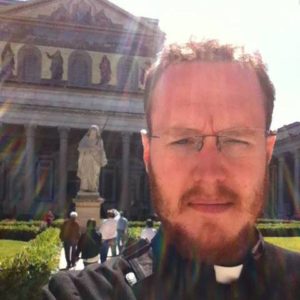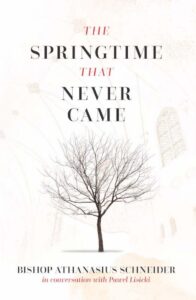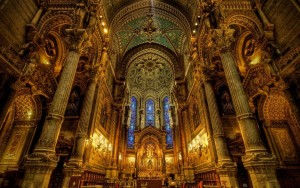This is a theological reflection on some principles found in our first reading this Sunday. It is a more theologically worded reflection than my homily today.
In our first reading we hear from the High Priest Joshua, who is seeking to unite the people of God by way of calling them to task about the Highest Good – Namely God. He is trying to bring unity and order to the community by emphasizing what is worth the most: God. The term “worship” literally is derived from the term “worth.” And so we arrive at two themes: unity and worship.
In this revelation we learn that the principle of unity is placing God first – which is not novel to ancient philosophers. For instance, in Aristotle’s teaching on friendship he said that friendships are essentially healthy when both people place as their highest-goal a seeking of the Truth. Now for us Christians who have been told that Christ is the Truth – we now know that the best friendships are those between two Christians who love something more than their own relationship – but namely God first.
But I’d like to return to the foundational principle that is establishing this reflection: the priest’s chief job is to unite, to bind up, to re-order the community and orient it towards God. Now we can speak about fragmentation or disunity in two ways: in relationship between people within a community or within the individual themselves. In both cases the principles remain the same. Within the individual there is a type of fragmentation that occurs particularly through three dimensions: the will, the intellect, and the appetites of our flesh. As complex human beings, we tend to find ourselves at war with ourselves. Various “parts” of our selves are competing for dominance. The part of us that wants pleasure is sometimes at odds with the part of us that wants to respect the dignity of another person. The part of us that wants to be healthy is at odds with the part of us that wants to indulge. The desire for truth can sometimes be at odds with the part of us that wants to avoid gossip.
The priest is not called to condemn any of these parts onto themselves, but he is called to rightly order them. To help the “will” align itself to the truth, but in a loving manner only known in the will. Pleasure is meant to be a side-effect of doing something good, not an end-in-itself. And so the priest in the old testament would accomplish this all as a number of activities that would help the broken person find a type of inner unity or harmony, a rightly ordered will, heart and mind. Excessive interior conflict leads to a type of restlessness that God never intends for us. God intends rest, a type of quiet harmony within ourselves. But the reality is, in order to get there we need to tap into what the priest is doing.
Amongst the many things a priest would do, one of the chief ways in which to rightly order us to God was through both thanksgiving and sacrifice. Sacrifice would be about dealing with the inner-disorder of our sinfulness, where our will was not oriented towards the truth, or God, but it was oriented towards our pride. So a sacrifice was an external act that gave the soul the opportunity to rightly order our heart, mind and will. By offering God a good sacrifice we would be demonstrating that we were willing to act for His glory, rather than our own. Although such sacrifices may have been conducted as just a show, the point is, the rending of our hearts was meant to occur through this action before God.
Graciously God would honor a sacrifice that was given in the right spirit. Recognizing the generosity of God the soul would be impelled to be thankful for God’s offering of mercy and forgiveness in accepting such a sacrifice, even though in reality it fell very short of making up for our sin. In both sacrifice and thanksgiving a type of worship places God at the center of our-lives, ordering our heart, our mind, and our choices (will) to God, making us whole. There are no competing elements within ourselves when all three of these parts are ordered to the same purpose, in the same Spirit.
Christ is the High-Priest whose goal is to make us One, a type of unity He wills for His Church. It was His prayer that we be One as He and the Father were One. This prayer comes about the night of the Last Supper, and prior to His crucifixion. Christ in these two actions is demonstrating most magnificently his priesthood, where he sacrifices Himself for the Father and for our salvation. Within Him, he is perfectly unified in purpose. And it though that sacrifice that he feeds us all the same meal – His body and blood. Christ sacrificed Himself so that we would be first in communion with Him, just as Joshua sought, and then by such unity, we would by the same purpose and spirit be united with each other.
I suppose the question we must ask ourselves as a community, whether local, diocesan, or universally is how united are we? If there is an absence of unity, what we know from Aristotle and from the Gospel itself is that Christ is not whom we are worshipping in Spirit and Truth. This is the necessary indictment from division, and it calls all individual Catholics to check in with ourselves about what is worth more to ourselves.
One of the ways we can examine if God is the highest good in our lives is to assess our habits. Habits of Mind (thoughts), choices, and even our desires/emotions. What do I spend the most amount of time fantasizing about – is it union with God or something else. Are my thoughts preoccupied with frivolous matters and many intentionally generated distractions, or with the beauty and goodness found in Truth? Is my quest for the truth merely an ideal, or do I live out the consequences of that truth by practically loving my next door neighbor – you know the one that drives you nuts?
What we all will find – all of us – is that we are all in our own part of the problem, part of the source of disunity. If we love unity, therefore, if we are seeking it as some good, then we must first seek it perusing God who is Unity-itself.
Photo: Public Domain






